UnintentionalChaos
International Hazard
    
Posts: 1454
Registered: 9-12-2006
Location: Mars
Member Is Offline
Mood: Nucleophilic
|
|
Glass Stirring Rods and Spatulas
Glass stirring rods may not be anywhere near the most expensive equipment the average amateur chemist owns, but they are nonetheless ubiquitous. I
also think it's nice to have at least one piece of equipment that you made in some way.
Current ebay prices put the typical 6mm wide, 12 inch (305mm) long stirring rod between $0.75 and $1 (USD) each before shipping. Instead of spending
my money on a dozen or so stirring rods, I purchased a large quantity of 6mm diameter clear borosilicate rod for glass working. I won 5lbs of rods for
only $5 (which comes to 51 pieces that are 24 inches (610mm) long) and picked them up since the seller was fairly local. Stirring rods that I make
from this glass cost me slightly under $0.05 each. They look like this as obtained, with crude broken ends:
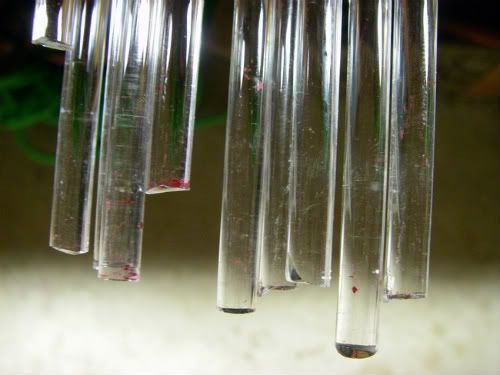
Normally, glass working (especially of borosilicate) is done with high-temperature torches, but for the simple application of rounding the end of the
rods, a plain propane plumbing torch is sufficient. To round the ends, hold the rod vertically in the flame like this:
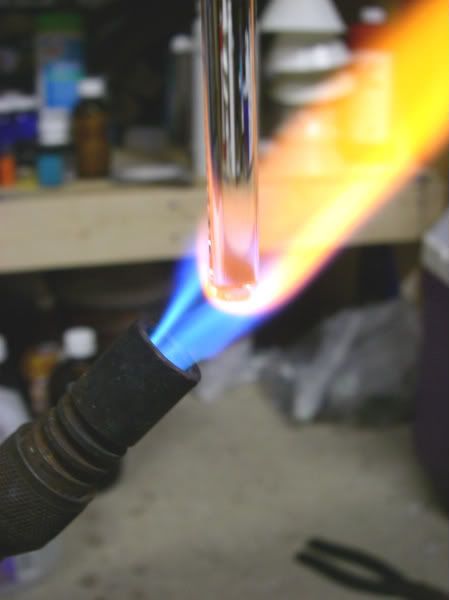
The glass does not soften too fast with such a cool flame, but after a minute or so, it has liquefied enough to ball up. After cooling, it looks like
this:
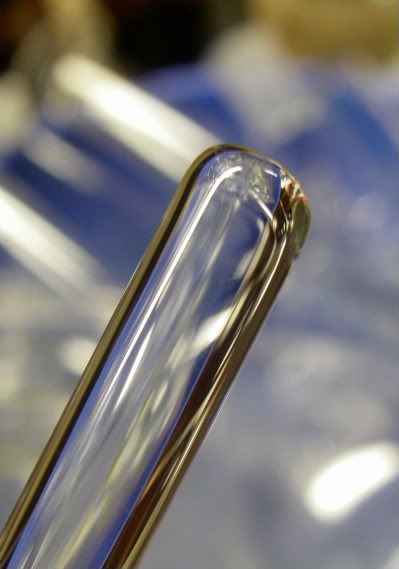
Repeat on the other end of the rod. Of course, these rods are 24 inches long, which would make for a very inconvenient stirring rod. Half of this
length is, however, a very nice size. Locate the center of the cooled rod and make a mark. You could just use brute force to break the rod, but if you
have a fine metal file, you can do better. Place the rod against a hard surface and slowly "saw" with the edge of the file perpendicular to the glass
rod until you make a small notch in the glass like this:
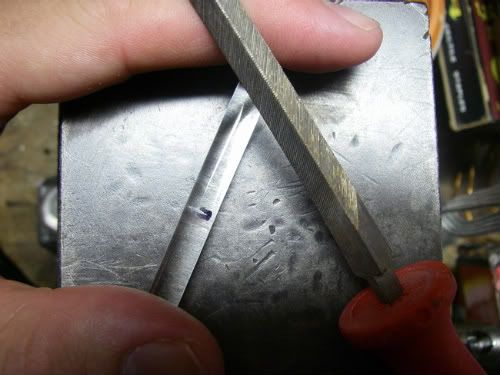
Slowly rotate the rod while continuing to "saw," using the notch as a guide until you make it all the way around. It will look like this when you
finish:

I recommend wrapping a towel around the rod before you break it to prevent any glass chips from going flying. Apply a moderate amount of force to the
spot where you scored the glass and it will give way with a more or less clean break. Mine, shown here, didn't want to cooperate with a perfect, flat
break, but you can see that the break propagated mostly. along the scored line:
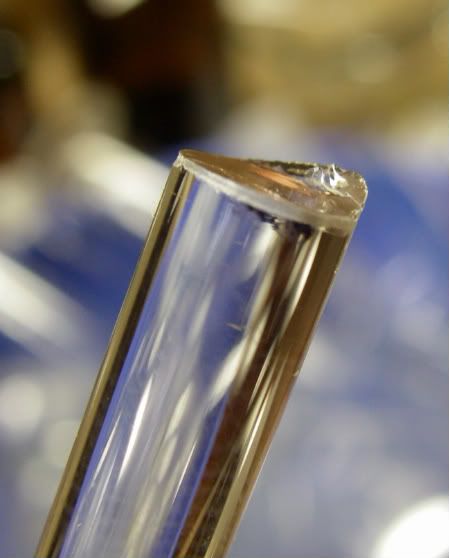
Repeat the procedure with the torch to round off the new ends. Repeat and you have yourself a lifetime supply of stirring rods for pennies.
Making a glass spatula
The typical laboratory spatula is stainless steel, which is acceptable for most commonly encountered chemicals, but fails for things like CuCl2 or
iodine when even traces of moisture are present. Plastic spatulas are also available, but for 5 cents, It's easy enough to make one out of glass.
For this, you'll need a pair of cheap pliers without teeth, which have a reasonably large surface area to the jaws. I use a pair of 8" linesman's
pliers that I took a shop grinder to. Heat up the end inch or so of glass until it starts to get soft, then insert the pliers into the flame (hence
the need for cheap, as this will ruin the temper) and use them to flatten the glass, reheating between each squeeze. When working with such a low
temperature flame, removing the glass item causes it to harden almost immediately. The metal on the pliers is a conductor of heat, and thus a bad
choice for glass working, but still usable if you take care to reheat the piece often. Use the jaws to reshape the spatula as you please and put a
bend in the end of it like this:
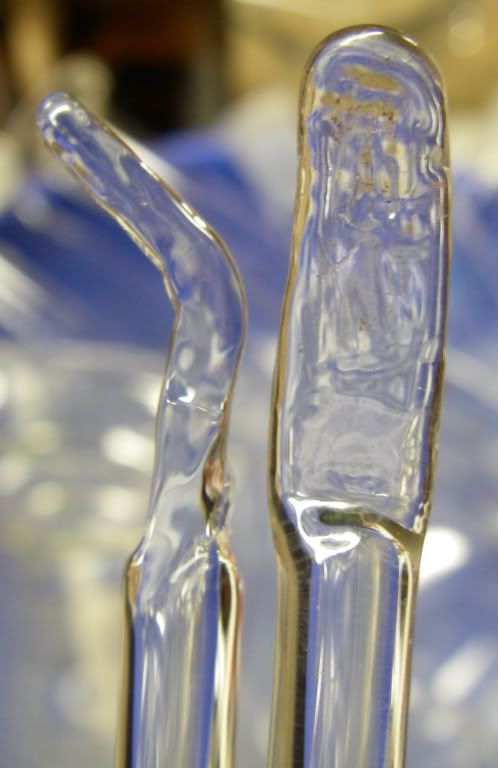
I wouldn't call them pretty, but they will do their job with the more aggressive solids in your chemical library. The small amount of rust on the
right spatula was from the pliers and is embedded in the glass, where it can do no harm.
Department of Redundancy Department - Now with paperwork!
'In organic synthesis, we call decomposition products "crap", however this is not a IUPAC approved nomenclature.' -Nicodem
|
|
|
Saerynide
National Hazard
   
Posts: 954
Registered: 17-11-2003
Location: The Void
Member Is Offline
Mood: Ionic
|
|
Nice  I'll try this on the gas stove next time. I'll try this on the gas stove next time.
"Microsoft reserves the right at all times to monitor communications on the Service and disclose any information Microsoft deems necessary to...
satisfy any applicable law, regulation or legal process"
|
|
|
Siddy
Hazard to Self
 
Posts: 81
Registered: 8-10-2007
Member Is Offline
Mood: No Mood
|
|
Haha, pretty, well done.
|
|
|
querjek
Hazard to Self
 
Posts: 76
Registered: 26-8-2008
Member Is Offline
Mood: No Mood
|
|
Thanks for the writeup!
it's all about chemistry.
|
|
|
starman
Hazard to Others
  
Posts: 318
Registered: 5-7-2008
Location: Western Australia
Member Is Offline
Mood: No Mood
|
|
Excellent quality on the photos,very professional looking.
Chemistry- The journey from the end of physics to the beginning of life.(starman)
|
|
|
UnintentionalChaos
International Hazard
    
Posts: 1454
Registered: 9-12-2006
Location: Mars
Member Is Offline
Mood: Nucleophilic
|
|
Thanks 
I know this isn't exactly a fascinating, innovative post, but maybe a couple people would find it useful. I contemplated prepub, being in the same
vein as the self-made reflux apparatus, which was (I think) the first addition to that forum. However, it seems very much out of place now since it's
almost all syntheses.
Department of Redundancy Department - Now with paperwork!
'In organic synthesis, we call decomposition products "crap", however this is not a IUPAC approved nomenclature.' -Nicodem
|
|
|
Sedit
International Hazard
    
Posts: 1939
Registered: 23-11-2008
Member Is Offline
Mood: Manic Expressive
|
|
Ah...... its pre publication and a place to get a feel for weather or not things are interesting. Plus its kinda cool. I say go for it and if it don't
make it to publications oh well atlest it was setup well. Nice work I like it. Sure beats the broken wine bottle shards that I have been fire
polishing
Knowledge is useless to useless people...
"I see a lot of patterns in our behavior as a nation that parallel a lot of other historical processes. The fall of Rome, the fall of Germany — the
fall of the ruling country, the people who think they can do whatever they want without anybody else's consent. I've seen this story
before."~Maynard James Keenan
|
|
|
UnintentionalChaos
International Hazard
    
Posts: 1454
Registered: 9-12-2006
Location: Mars
Member Is Offline
Mood: Nucleophilic
|
|
I have something a little more interesting for prepub that I'm working on right now, anyway. 
I look through the forums and this site should have a published list a mile long if people would take the time to formalize and write up procedures.
So much good info is buried in long, rambling threads.
Department of Redundancy Department - Now with paperwork!
'In organic synthesis, we call decomposition products "crap", however this is not a IUPAC approved nomenclature.' -Nicodem
|
|
|